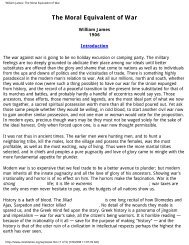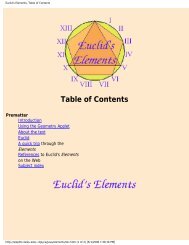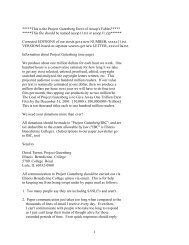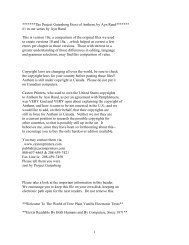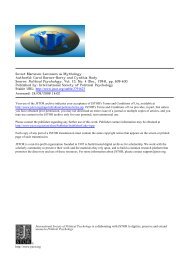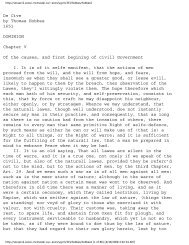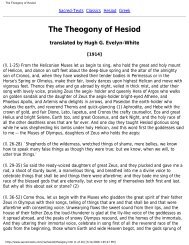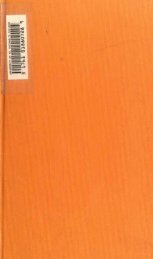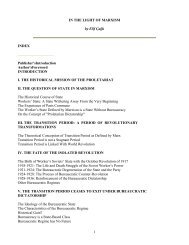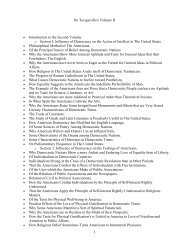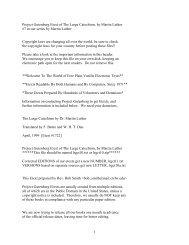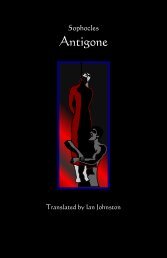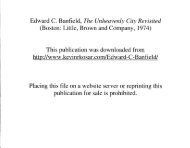- Page 5 and 6: THE SACRED BOOKS AND EARLY LITERATU
- Page 8 and 9: i- i ' ' t i t 1 i "^ 1 *
- Page 10 and 11: ) " Let there be light." GENESIS I,
- Page 12 and 13: i CONTENTS PAGE V. THE HITOPADESA,
- Page 14 and 15: A word as to the pronunciation of H
- Page 16 and 17: S THE SACRED BOOKS many races. Most
- Page 18 and 19: 4 THE SACRED BOOKS examine. Our sea
- Page 20 and 21: 6 THE SACRED BOOKS able hymn, proba
- Page 22 and 23: 8 THE SACRED BOOKS universe by mere
- Page 24 and 25: 10 THE SACRED BOOKS pithy couplets
- Page 27 and 28: THE EIG-VEDA (INTRODUCTION) THE nam
- Page 29 and 30: LITERATURE OF THE EAST 15 One other
- Page 31 and 32: LITERATURE OF THE EAST 17 2. O Vayu
- Page 33 and 34: LITERATURE OF THE EAST 19 2. They h
- Page 35 and 36: LITERATURE OF THE EAST 21 8. They a
- Page 37 and 38: LITERATURE OF THE EAST 23 5. They m
- Page 39: LITERATURE OF THE EAST 25 carries o
- Page 43 and 44: equal valor, O hero ! LITERATURE OF
- Page 45 and 46: ' LITERATURE OF THE EAST 81 him wit
- Page 47 and 48: LITERATURE OF THE EAST 33 Maruts, s
- Page 49 and 50: LITERATURE OF THE EAST 35 4. Move a
- Page 51 and 52: LITERATURE OF THE EAST 37 8. No one
- Page 53 and 54: LITERATURE OF THE EAST 39 of your g
- Page 55 and 56: LITERATURE OF THE EAST 41 our men b
- Page 57 and 58: LITERATURE OF THE EAST 43 3. May th
- Page 59 and 60: LITERATURE OF THE EAST 45 HYMNS BY
- Page 61 and 62: LITERATURE OF THE EAST 47 Thence I
- Page 63 and 64: LITERATURE OF THE EAST 49 1. In the
- Page 65: THE ATHARVA VEDA AND BRlHMAVAS "At
- Page 68 and 69: 54 THE SACRED BOOKS them another fa
- Page 70 and 71: 56 THE SACRED BOOKS Atef&e tip of m
- Page 72 and 73: 58 THE SACRED BOOKS A garner art th
- Page 74 and 75: 60 THE SACRED BOOKS in the same har
- Page 76 and 77: 6fc THE SACRED BOOKS in it. When I
- Page 78 and 79: 64. THE SACRED BOOKS the boys have
- Page 81: THE UPANISHADS "From every sentence
- Page 84 and 85: 70 THE SACRED BOOKS Moreover, the M
- Page 86: THE UPANISHADS THE AITAREYA UPANISH
- Page 90 and 91:
74 THE SACRED BOOKS The generative
- Page 92 and 93:
76 THE SACRED BOOKS which helps to
- Page 94 and 95:
78 THE SACRED BOOKS in that heavenl
- Page 96 and 97:
80 THE SACRED BOOKS THE MUNDAKA UPA
- Page 98 and 99:
82 THE SACRED BOOKS 4. Kali (black)
- Page 100 and 101:
84 THE SACRED BOOKS 8. The seven se
- Page 102 and 103:
86 THE SACRED BOOKS other lord (isa
- Page 104 and 105:
88 THE SACRED BOOKS He overcomes gr
- Page 106 and 107:
90 THE SACRED BOOKS u 9. That which
- Page 108:
92 THE SACRED BOOKS 1. She replied
- Page 112 and 113:
94 THE SACRED BOOKS THE ISA UPANISH
- Page 114 and 115:
96 THE SACRED BOOKS we call them sa
- Page 116 and 117:
98 THE SACRED BOOKS 6. " Look back
- Page 118 and 119:
100 THE SACRED BOOKS 21. Death said
- Page 120 and 121:
102 THE SACRED BOOKS man of true re
- Page 122 and 123:
104 THE SACRED BOOKS wise, those ho
- Page 124 and 125:
106 THE SACRED BOOKS 5. " He who kn
- Page 126 and 127:
108 THE SACRED BOOKS 9. " As the on
- Page 128:
110 THE SACRED BOOKS been apprehend
- Page 132 and 133:
112 THE SACRED BOOKS BRAHMA, OR THE
- Page 135:
THE MAHABHAEATA TRANSLATED BY SIR E
- Page 138 and 139:
118 THE SACRED BOOKS symbol of just
- Page 140 and 141:
THE MAHABHARATA THE SONG CELESTIAL;
- Page 142 and 143:
122 THE SACRED BOOKS Of life itself
- Page 144 and 145:
124 THE SACRED BOOKS I know not wha
- Page 146 and 147:
126 THE SACRED BOOKS Is birth : thi
- Page 148 and 149:
128 THE SACRED BOOKS But thou, want
- Page 150 and 151:
180 THE SACRED BOOKS The mind That
- Page 152 and 153:
133 THE SACRED BOOKS Work ! sacrifi
- Page 154 and 155:
134 THE SACRED BOOKS To like and di
- Page 156 and 157:
136 THE SACRED BOOKS By sacred flam
- Page 158 and 159:
138 THE SACRED BOOKS Left of such s
- Page 160 and 161:
140 THE SACRED BOOKS By taint of de
- Page 162 and 163:
142 THE SACRED BOOKS Lover of all t
- Page 164 and 165:
144 THE SACRED BOOKS By stress of s
- Page 166 and 167:
146 THE SACRED BOOKS Amid the mild
- Page 168 and 169:
148 THE SACRED BOOKS Which hideth m
- Page 170 and 171:
150 THE SACRED BOOKS Means Adhidaiv
- Page 172 and 173:
152 THE SACRED BOOKS Yea ! this vas
- Page 174 and 175:
154 THE SACRED BOOKS Of my hid Natu
- Page 176 and 177:
156 THE SACRED BOOKS But them that
- Page 178 and 179:
158 THE SACRED BOOKS Declared by al
- Page 180:
160 THE SACRED BOOKS The flower-wre
- Page 184 and 185:
162 THE SACRED BOOKS With his all-r
- Page 186 and 187:
164 THE SACRED BOOKS Awful One! Mys
- Page 188 and 189:
166 THE SACRED BOOKS Like moths whi
- Page 190 and 191:
168 THE SACRED BOOKS In all, Vayu t
- Page 192 and 193:
170 THE SACRED BOOKS Let me once mo
- Page 194 and 195:
172 THE SACRED BOOKS Forth from lif
- Page 196 and 197:
174 THE SACRED BOOKS Humbleness, tr
- Page 198 and 199:
176 THE SACRED BOOKS Worshiping ; y
- Page 200 and 201:
178 THE SACRED BOOKS When at all ga
- Page 202 and 203:
180 THE SACRED BOOKS CHAPTER XV KRI
- Page 204 and 205:
182 THE SACRED BOOKS Koot, leaf, an
- Page 206 and 207:
184 THE SACRED BOOKS But is none ot
- Page 208 and 209:
186 THE SACRED BOOKS To Pretas and
- Page 210 and 211:
188 THE SACRED BOOKS The gift churl
- Page 212 and 213:
190 THE SACRED BOOKS Knowledge, the
- Page 214 and 215:
192 THE SACRED BOOKS Hear further,
- Page 216 and 217:
194 THE SACRED BOOKS Me as I am, ho
- Page 218 and 219:
196 THE SACRED BOOKS Hath come unto
- Page 220 and 221:
198 THE SACRED BOOKS He crowned, an
- Page 222 and 223:
200 THE SACRED BOOKS Tasting no mea
- Page 224 and 225:
202 THE SACRED BOOKS " Then Yudhish
- Page 226 and 227:
204 THE SACRED BOOKS " And Yudhisht
- Page 228 and 229:
206 THE SACRED BOOKS Hath Yudhishth
- Page 230 and 231:
208 THE SACRED BOOKS " Then answer
- Page 232 and 233:
210 THE SACRED BOOKS By all those w
- Page 234 and 235:
THE SACRED BOOKS Nakula and Sahadev
- Page 236 and 237:
Ah, saintly Lord Ah, thou that hast
- Page 238:
216 THE SACRED BOOKS The Presences
- Page 242 and 243:
218 THE SACRED BOOKS Seeing Mandhat
- Page 245:
THE HITOPADESA OB BOOK OF GOOD COUN
- Page 248 and 249:
" Silly glass, in splendid settings
- Page 250 and 251:
226 THE SACRED BOOKS awakening, saw
- Page 252 and 253:
228 THE SACRED BOOKS Here his medit
- Page 254 and 255:
230 THE SACRED BOOKS Golden-skin, w
- Page 256 and 257:
THE SACRED BOOKS of Day, whose diad
- Page 258 and 259:
234 THE SACRED BOOKS ' Sir/ said th
- Page 260 and 261:
236 THE SACRED BOOKS upon returning
- Page 262 and 263:
238 THE SACRED BOOKS " Whither woul
- Page 264 and 265:
240 THE SACRED BOOKS ' And herein,
- Page 266 and 267:
* Be not haughty, being wealthy ; d
- Page 268 and 269:
244 THE SACRED BOOKS ' What made th
- Page 270 and 271:
246 THE SACRED BOOKS ' Who art thou
- Page 272 and 273:
248 THE SACRED BOOKS instantly drop
- Page 274 and 275:
250 THE SACRED BOOKS Moved by these
- Page 276 and 277:
252 THE SACRED BOOKS to monkeys, he
- Page 278 and 279:
' Nearest to the King is dearest, b
- Page 280 and 281:
256 THE SACRED BOOKS 'And a fool ma
- Page 282 and 283:
258 THE SACRED BOOKS Curd-ear to co
- Page 284 and 285:
260 THE SACRED BOOKS 1 ' 1 think so
- Page 286 and 287:
262 THE SACRED BOOKS Take this less
- Page 288 and 289:
* What force would fail to win, fra
- Page 290 and 291:
266 THE SACRED BOOKS " I have heard
- Page 292 and 293:
268 THE SACRED BOOKS THE STORY OF T
- Page 294 and 295:
270 THE SACRED BOOKS I thought his
- Page 296:
272 THE SACRED BOOKS When the next
- Page 300 and 301:
274 THE SACRED BOOKS jeering at us;
- Page 302 and 303:
276 THE SACRED BOOKS ' ' It were we
- Page 304 and 305:
278 THE SACRED BOOKS Needs must tha
- Page 306 and 307:
280 THE SACRED BOOKS ' I know such
- Page 308 and 309:
THE SACRED BOOKS anointed me King.
- Page 310 and 311:
284. THE SACRED BOOKS ' interrupted
- Page 312 and 313:
286 THE SACRED BOOKS ' It might be,
- Page 314 and 315:
288 THE SACRED BOOKS Accordingly th
- Page 316 and 317:
290 THE SACRED BOOKS ' It shall be
- Page 318 and 319:
292 THE SACRED BOOKS PEACE When the
- Page 320 and 321:
294 THE SACRED BOOKS was as unfaith
- Page 322 and 323:
296 THE SACRED BOOKS returned, ' if
- Page 324 and 325:
298 Well, but,' said King Jewel-plu
- Page 326 and 327:
300 THE SACRED BOOKS ' Brahmans for
- Page 328 and 329:
302 THE SACRED BOOKS ' Cheating the
- Page 330 and 331:
304 THE SACRED BOOKS ' ' Good Crow/
- Page 332 and 333:
306 THE SACRED BOOKS Another plank
- Page 334 and 335:
308 THE SACRED BOOKS ' he finished
- Page 336 and 337:
310 THE SACRED BOOKS Thanks to you,
- Page 339 and 340:
tfAKUNTALA BENEDICTION Isa preserve
- Page 341 and 342:
LITERATURE OF THE EAST 315 My thoug
- Page 343 and 344:
LITERATURE OF THE EAST :il7 Than th
- Page 345 and 346:
LITERATURE OF THE EAST 319 KING [wa
- Page 347 and 348:
LITERATURE OF THE EAST .! $AKUNTALA
- Page 349 and 350:
LITERATURE OF THE EAST 9*3 Who dare
- Page 351 and 352:
KING. ifl excited ; LITERATURE OF T
- Page 353 and 354:
LITERATURE OF THE EAST 327 shrubs f
- Page 355 and 356:
LITERATURE OF THE EAST 329 branch o
- Page 357 and 358:
LITERATURE OF THE EAST 381 tion. I
- Page 359 and 360:
LITERATURE OF THE EAST Sire, the ad
- Page 361 and 362:
LITERATURE OF THE EAST 335 The maid
- Page 363 and 364:
LITERATURE OF THE EAST ij;r, MATHAV
- Page 365 and 366:
LITERATURE OF THE EAST 339 MATHAVYA
- Page 367 and 368:
LITERATURE OF THE EAST 341 somethin
- Page 369 and 370:
LITERATURE OF THE EAST Was scorched
- Page 371 and 372:
LITERATURE OF THE EAST 845 With coo
- Page 373 and 374:
LITERATURE OF THE EAST 347 has fixe
- Page 375 and 376:
LITERATURE OF THE EAST :JID I know
- Page 377 and 378:
F LITERATURE OF THE EAST 351 Allay
- Page 379 and 380:
LITERATURE OF THE EAST M 3 In falte
- Page 383 and 384:
LITERATURE OF THE EAST 355 Shall I
- Page 385 and 386:
LITERATURE OF THE EAST 357 Lord of
- Page 387 and 388:
LITERATURE OF THE EAST 359 vada, wh
- Page 389 and 390:
LITERATURE OF THE EAST Straightway
- Page 391 and 392:
SARNGARAVA. LITERATURE OF THE EAST
- Page 393 and 394:
LITERATURE OF THE EAST way to cheer
- Page 395 and 396:
LITERATURE OF THE EAST 367 We ask n
- Page 397 and 398:
LITERATURE OE THE E \ST Together wi
- Page 399 and 400:
LITERATURE OF THE EAST 371 to the s
- Page 401 and 402:
LITERATURE OF THE EAST 578 happy wh
- Page 403 and 404:
LITERATURE OF THE EAST .57 > has ju
- Page 405 and 406:
LITERATURE OF THE EAST [aside] . Ah
- Page 407 and 408:
LITERATURE OF THE EAST 379 KING [st
- Page 409 and 410:
LITERATURE OF THE EAST SSI entruste
- Page 411 and 412:
LITERATURE OF THE EAST house until
- Page 413 and 414:
LITERATURE OF Till LAST By his own
- Page 415 and 416:
LITERATURE OF THE EAST 387 MATALI.
- Page 417 and 418:
LITERATURE OF THE EAST MATALI. Grea
- Page 419 and 420:
LITERATURE OF THE EAST 391 to relea
- Page 421 and 422:
LITERATURE OF THE EAST 393 CHILD [t
- Page 423 and 424:
$AKUNTALA. KING. LITERATURE OF THE
- Page 425 and 426:
LITERATURE OF THE EAST 397 Of death
- Page 427 and 428:
LITERATURE OF THE EAST of $akuntala
- Page 429 and 430:
LITERATURE OF THE EAST 401 KASYAPA.
- Page 431:
LITERATURE OF THE EAST, 403 TO THE
- Page 434:
406 BIBLIOGRAPHY SIR EDWIN ARNOLD,



